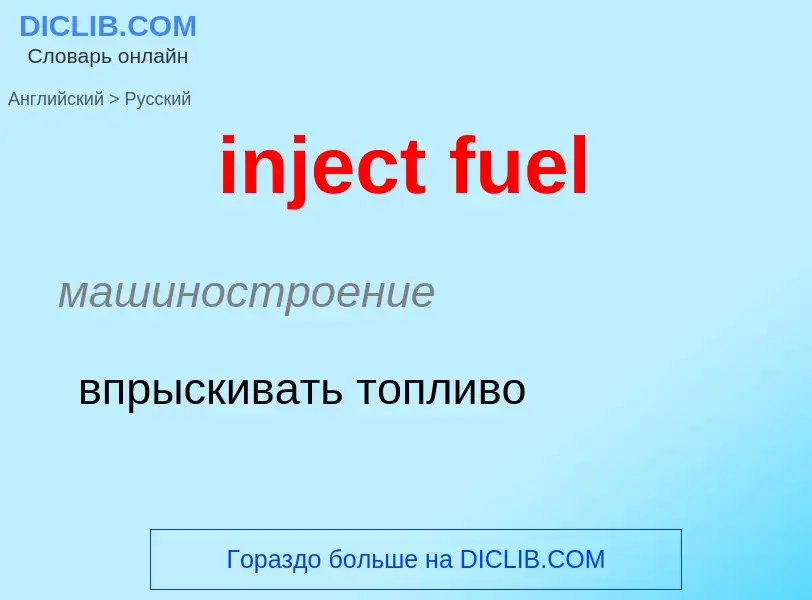ترجمة وتحليل الكلمات عن طريق الذكاء الاصطناعي ChatGPT
في هذه الصفحة يمكنك الحصول على تحليل مفصل لكلمة أو عبارة باستخدام أفضل تقنيات الذكاء الاصطناعي المتوفرة اليوم:
- كيف يتم استخدام الكلمة في اللغة
- تردد الكلمة
- ما إذا كانت الكلمة تستخدم في كثير من الأحيان في اللغة المنطوقة أو المكتوبة
- خيارات الترجمة إلى الروسية أو الإسبانية، على التوالي
- أمثلة على استخدام الكلمة (عدة عبارات مع الترجمة)
- أصل الكلمة
inject fuel - ترجمة إلى الروسية
машиностроение
впрыскивать топливо
общая лексика
жидкое котельное топливо
мазут
нефтегазовая промышленность
жидкое топливо, топливная жидкость (нефть, мазут, нефтяное топливо)
нефтегазовая промышленность
тяжёлый газойль
ويكيبيديا
Nuclear fuel is material used in nuclear power stations to produce heat to power turbines. Heat is created when nuclear fuel undergoes nuclear fission.
Most nuclear fuels contain heavy fissile actinide elements that are capable of undergoing and sustaining nuclear fission. The three most relevant fissile isotopes are uranium-233, uranium-235 and plutonium-239. When the unstable nuclei of these atoms are hit by a slow-moving neutron, they frequently split, creating two daughter nuclei and two or three more neutrons. In that case, the neutrons released go on to split more nuclei. This creates a self-sustaining chain reaction that is controlled in a nuclear reactor, or uncontrolled in a nuclear weapon. Alternatively, if the nucleus absorbs the neutron without splitting, it creates a heavier nucleus with one additional neutron.
The processes involved in mining, refining, purifying, using, and disposing of nuclear fuel are collectively known as the nuclear fuel cycle.
Not all types of nuclear fuels create power from nuclear fission; plutonium-238 and some other isotopes are used to produce small amounts of nuclear power by radioactive decay in radioisotope thermoelectric generators and other types of atomic batteries.
Nuclear fuel has the highest energy density of all practical fuel sources.

!['''ATR Core''' The [[Advanced Test Reactor]] at [[Idaho National Laboratory]] uses plate-type fuel in a clover leaf arrangement. The blue glow around the core is known as [[Cherenkov radiation]]. '''ATR Core''' The [[Advanced Test Reactor]] at [[Idaho National Laboratory]] uses plate-type fuel in a clover leaf arrangement. The blue glow around the core is known as [[Cherenkov radiation]].](https://commons.wikimedia.org/wiki/Special:FilePath/Advanced Test Reactor.jpg?width=200)

![Close-up of a replica of the core of the [[research reactor]] at the [[Institut Laue-Langevin]] Close-up of a replica of the core of the [[research reactor]] at the [[Institut Laue-Langevin]]](https://commons.wikimedia.org/wiki/Special:FilePath/ILL core 8358 extract.jpg?width=200)




![''Cassini'' spacecraft]] RTGs before launch ''Cassini'' spacecraft]] RTGs before launch](https://commons.wikimedia.org/wiki/Special:FilePath/RTG radiation measurement.jpg?width=200)



![[[Nuclear Regulatory Commission]] (NRC) photo of unirradiated (fresh) fuel pellets. [[Nuclear Regulatory Commission]] (NRC) photo of unirradiated (fresh) fuel pellets.](https://commons.wikimedia.org/wiki/Special:FilePath/Fuel Pellet.jpg?width=200)


![An [[oil tanker]] taking on fuel, or "[[bunkering]]" An [[oil tanker]] taking on fuel, or "[[bunkering]]"](https://commons.wikimedia.org/wiki/Special:FilePath/Bunkering-or-taking-fuel.jpg?width=200)

![A fuel station in [[Zigui County]] on the [[Yangtze]] River A fuel station in [[Zigui County]] on the [[Yangtze]] River](https://commons.wikimedia.org/wiki/Special:FilePath/Zigui-Sinopec-boat-fuel-station-4959.jpg?width=200)
